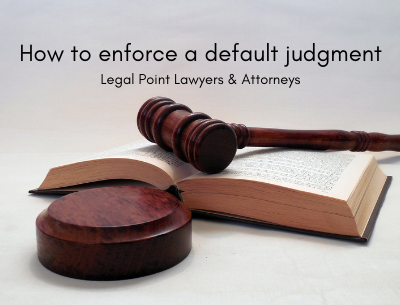
How to enforce a default judgment when the defendant does not respond
According to a 2016 report published by the Law and Justice Foundation of New South Wales, a sizeable 37% of Local Court matters were finalised through default judgment. Fair to say that without this summary disposal process, many cases would remain unresolved, and injustice would be prevalent.
A default judgment applies to proceedings commenced by statement of claim in the Local Court, District Court or Supreme Court and can be entered if the defendant is in “default”. A defendant is in default if the defendant fails to file a defence within 28 days of serving the defendant with the statement of claim. However, a defendant is not in default if the defendant has made a payment towards a liquidated claim. This article will explore the consequences of a default judgment and the procedure of obtaining one.
Consequences
Significant financial consequences are attached to default judgments. After a default judgment is entered, the plaintiff can commence action to enforce the default judgment against the defendant. Enforcement actions include, but are not limited to, writ for the levy of property, garnishee orders and bankruptcy. Furthermore, the plaintiff can seek additional legal costs and interest from conducting the enforcement action.
Another consequence of a default judgment is that it can be recorded on the defendant’s credit report and negatively impact the defendant’s ability to borrow from banks and other financial institutions.
Procedure
The procedure concerning a default judgment will depend upon whether the plaintiff’s claim is liquidated or unliquidated.
A liquidated claim is one where the amount claimed is known or can be determined. Examples of a liquidated claim are loan agreements and building contracts which contain clauses by which parties fixed the total damages if a breach occurs. For liquidated claims, an affidavit in support, an affidavit of service and a notice of motion need to be filed in court. If these documents are in order, the registrar will sign and seal a form of the judgment without the need for you to attend court. A signed and dated copy of the judgment will be sent to the plaintiff or the registrar will send a notice to the plaintiff that confirms the default judgment was entered.
An unliquidated claim includes a claim for damages and will need an assessment by the court. Examples include motor vehicle accidents and defamation claims. Unliquidated claims are usually case managed.
If the plaintiff does not apply for a default judgment within 9 months of filing a statement of claim, the court can dismiss the case. Once a default judgment is entered, the plaintiff has 12 years from the date of judgment to enforce the default judgment.
Conclusion
Therefore, default judgments are very important to the operation of the civil justice system as they present an outlet for plaintiffs to resolve their matters when defendants fail to respond. When a default judgment is entered, proceedings are concluded without the need to attend trial and the plaintiff will have access to a wide range of enforcement actions. If a defendant does not respond to your claim, you should seek a lawyer to prepare a notice of motion (default judgment). Our civil litigation team at Legal Point Lawyers has profound experience so you can be assured that you will get the outcome you deserve.
Disclaimer: This publication is general information only and does not purport to provide legal advice. We do not accept responsibility for any losses for reliance upon this publication.

Ge Wu is the solicitor director of Legal Point Lawyers & Attorneys. He has been admitted to practise law since 2005. Throughout his practice, Ge Wu predominantly practises in the areas of Property Law, Immigration Law, Commercial Law, Civil Litigation and Family Law.
His experience covers all aspects of property law, commercial/retail lease, immigration law and civil litigation, while at the same time, he also has experience in family law, criminal law and other areas such as will-drafting and general advice.
He has frequently been instructed by corporate clients in pre-acquisition due diligence reports, structuring property development, land/shopping centre acquisitions, G.S.T. and stamp duty advice for buying/selling businesses, as well as share transfers and company re-structures.
Ge Wu has been appointed as Notary Public since 2011 and started to provide Notary Public service to clients from different cultural backgrounds.
Mobile: 0433539869
